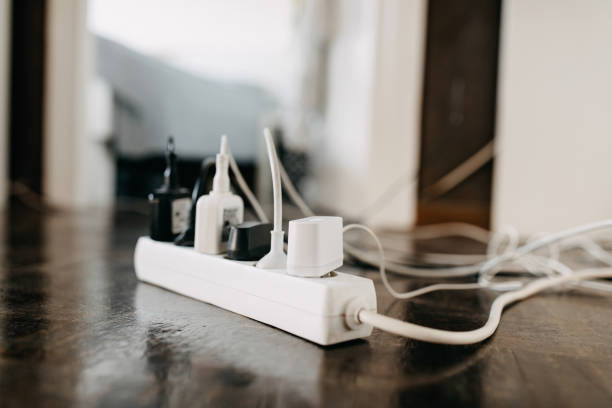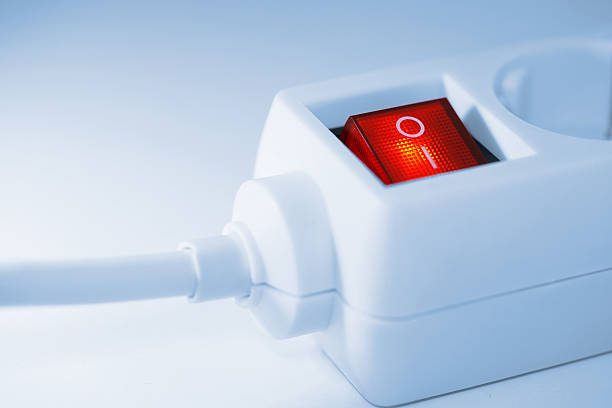Whether you’re trying to power a tool or lights, it’s important to make sure that your electrical wiring is safe. Don’t ignore problems that could be dangerous, like a breaker that keeps tripping or a cord that feels hot.
Follow these electrical safety tips to prevent potential fire hazards in your home or workplace:

Don’t Bend Them
If you’re like most people, you grab a cord when you need power in a place where an outlet isn’t handy. But this can lead to big problems if you’re not careful with your extension cords.
Bending the ends of a long cord can puncture its insulation and expose the wire, which may cause it to overheat or even catch fire. This is why it’s best to keep your extension cords straight when in use and storing them.
You also should avoid running any extension cord through doors or windows. Repeated exposure to moisture can corrode the prongs in the plug, which could reduce your extension cord’s functionality and raise the risk of shocks or fires. Also, avoid routing cords through carpet. People stepping on them can cause excessive flexing, which lowers extension cord safety. This will also make it harder to inspect your cords for signs of damage or wear.
Don’t Place Them Under Carpet
Many people put extension cords under rugs to keep them out of sight. This practice is a major safety hazard because it can cause the cords to become damaged.
The wires in extension cords release heat as electricity runs through them. If this heat can’t escape, the cords may overheat and even catch fire. Running wires under carpets can also lead to tripping hazards because the cords are harder to see.
Instead of hiding cords under rugs, consider using flat extension cables with smooth and compact designs that won’t stick out as much. In addition, use only three-prong extension cords. This type of cord has a round “grounding prong” that helps to protect your devices and you from electrical malfunctions and shocks. Never remove this grounding prong from a cord. This is against the law and can be very dangerous!
Don’t Use Nails Or Staples To Attach Them
Sometimes, we need to power appliances or devices that require more current than a standard cord can handle. That’s why many of us rely on extension cords. However, these useful tools can be dangerous if used improperly.
The use of nails or staples to attach extension cords can puncture the cord’s insulation and cause it to heat up, leading to a fire hazard. They also pose a danger to people walking by who can accidentally step on them or have them pulled down and tripped over.
Another important safety rule is to not run cords through doorways or under carpets. The cords can get ripped apart by people opening and closing doors, which exposes the wires to heat and moisture. You should also never chain multiple extension cords together or plug a single extension cord into itself. Instead, plug the cord directly into a mounted electrical outlet.

Don’t Try To Force A Three-Prong Plug Into A Two-Prong Outlet
Tools exist for specific tasks and perform best when used correctly. If a tool is misused, it can break or cause injury to the user. Electricians go through extensive training to learn proper techniques. They may take some physical lumps while practicing, but it helps them avoid mistakes that can lead to fires or electrical damage.
Using extension cords incorrectly creates tripping hazards, can damage the wire insulation or expose it to heat, and pose a fire hazard. To prevent this, make sure that you select the appropriate cord based on its gauge (thickness), power rating and length. You should also be careful not to run them through doorways, windows or under carpets where they could become pinched. Inspect your extension cords regularly for nicks or crimps in the insulation and any exposed or frayed sections near the plug. Any that are showing signs of damage should be discarded immediately.
Don’t Run Them Through Walls Or Ceilings
Using extension cords as substitutes for permanent wiring is dangerous. It increases the risk of fires in your home. Extension cords should only be used to power tools and appliances that are temporarily in use.
They should not be run through doorways, walls or ceilings because this can cause them to overheat. Also, don’t cover them with rugs because this will prevent heat from escaping and could pose a fire hazard.
It’s important to keep your extension cords out of the way and away from foot traffic because this can prevent tripping and falling over them. Also, if you have too many cords, it’s best to have an Electrician Macleod install additional outlets to avoid overloading them. It’s also a good idea to never alter your extension cords, such as cutting the third prong in order to fit them into two-prong outlets because this can be dangerous and defeats their purpose of being grounded.
Don’t Store Them in a Dirty Environment
Using extension cords is convenient, but when they’re not properly stored they can pose safety risks. Cords that are tangled or tripping hazards can lead to injuries from falls and electric shocks. Properly coiling your cords can prevent them from becoming tangled and can extend their lifespan by protecting the wires from damage.
Exposing cords to harsh environmental factors such as extreme heat or moisture can degrade their insulation and cause them to become a fire hazard. Cords that are corroded or in poor condition should be permanently discarded.
If you find yourself frequently using extension cords it could be a sign that there are not enough outlets in your home or office to accommodate your equipment. Have a professional electrician install additional outlets so you don’t need to use temporary wiring solutions. This will also help reduce the risk of tripping, fire, and overheating.
